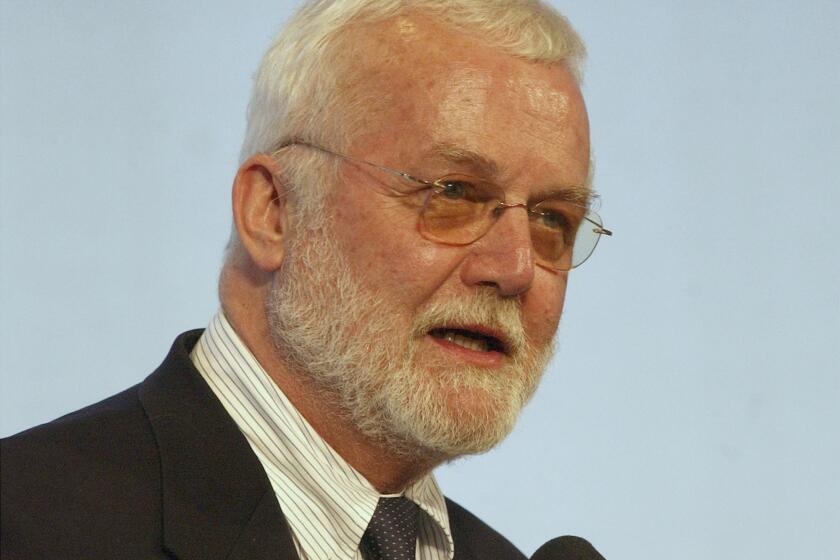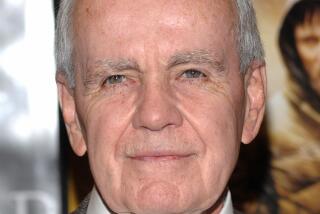5 essential Russell Banks novels you should read

On the Shelf
Five essential Russell Banks novels
If you buy books linked on our site, The Times may earn a commission from Bookshop.org, whose fees support independent bookstores.
The novelist Russell Banks, who died Sunday at 82 in New York, spent a six-decade career building on a handful of favorite themes: the death of childhood innocence; the depredations of working-class life; the dubious appeal of Florida, New England or the Caribbean. These recursive efforts were not, however, acts of simple repetition; they reflected an urge to dig ever deeper into subjects that mattered to him most. “Novelists keep going back to images that retain power for them and recycling them, reusing them in another context, coming at them from another angle to see what they suggest from there,” he told the Paris Review in 1998.
A two-time Pulitzer finalist, Banks published poetry, short stories and novels in relative obscurity for a decade before finding critical acclaim and mainstream success in the mid-1980s. In 1997, two adaptations of his novels became acclaimed films: “Affliction” and “The Sweet Hereafter.” And he’s written screenplays as well, including one for an unproduced film version of Jack Kerouac’s “On the Road.” But his books are the best place to know him, and he was working right through his death, publishing his final novel, “The Magic Kingdom,” last November. For those now seeking to know him better, these five favorites provide at least an entry point into his most essential work.
Prize-winning author known for ‘Continental Drift’ and ‘Cloudsplitter’ had just published his 14th novel, ‘The Magic Kingdom.’
‘Continental Drift’
(1985)
Telling the story of a struggling New England laborer and a Haitian woman whose lives intersect off the coast of Florida, this is Banks’ grand, brilliant epic — and the best place to start with him. Banks captures the sense of the American dream sinking fast on two fronts, delivering a melancholy but spirited attack on promises of easy money and human cruelty. Banks was determined, as the book’s final line puts it, to “help destroy the world as it is.”
‘Affliction’
(1989)
Banks’ wintry, autobiographical sixth novel turns on the lifelong conflict between a dissolute New Hampshire police officer and his son. It is a tale steeped in violence, alcoholism and a truckload of toxic masculinity. In addition to featuring one of the most cringe-inducing portrayals of home dentistry in American literature, it’s also an engrossing and intimate portrait of small-town life, alert to its frustrations and limitations.
At one point near the end of this novel about male brutality and family violence and squalor, the narrator asks a question that strikes fear into the reader’s heart--not fear of violence, but fear that the question may suggest much more about Russell Banks’ new novel (his 10th book) than could have been intended.
‘Rule of the Bone’
(1995)
Chappie, the straight-talking 14-year-old hero of this novel, bails on his very Banks-ian abusive stepfather, heading from upstate New York to Jamaica, where he becomes embroiled in the drug trade. Between Chappie’s defiant voice (“You’ll probably think I’m making a lot of this up…”) and a plot that turns on a Black companion for the novel’s white suburban narrator, the novel drew instant comparisons to “The Catcher in the Rye” and “The Adventures of Huckleberry Finn.” But this is a grimmer kind of boy’s book, less fit for a classroom but more candid about the damage adults inflict on children.
‘Cloudsplitter’
(1998)
Banks’ most ambitious novel is a fictionalization of the life of abolitionist John Brown, who led an 1859 slave revolt at Harpers Ferry and was executed shortly thereafter. Told from the perspective of Brown’s son Owen, the novel is Banks’ attempt to work through his obsessions with the stains on American history, fathers and sons and the “foolish, dreamy, sentimental celebrations” of Great Man narratives.
Russell Banks’ ‘The Magic Kingdom’ finds a man explaining why he sold his land to Disney and why Florida is ‘a catch basin for the world’s detritus.’
‘The Magic Kingdom’
(2022)
Banks’ final novel was one last story about a boy tragically battered by grown-up whims. The narrator, Harley, recalls his time at a Florida Shaker colony in the early 1900s, where a budding romance eventually sets the entire community off-kilter. The book features some of Banks’ most lyrical writing, but the skeptical edge is still there, deeply critical of religious and capitalist patter and indicting the Sunshine State as “a catch basin for the world’s detritus.”
…
Athitakis is a writer in Phoenix and author of “The New Midwest.”
More to Read
Sign up for our Book Club newsletter
Get the latest news, events and more from the Los Angeles Times Book Club, and help us get L.A. reading and talking.
You may occasionally receive promotional content from the Los Angeles Times.










